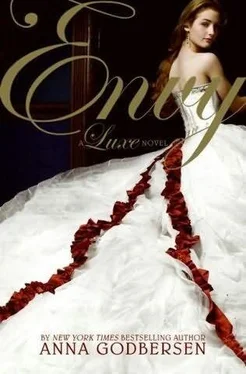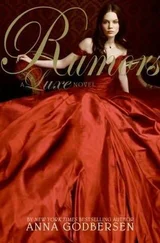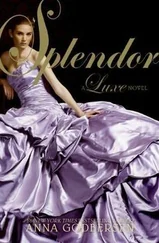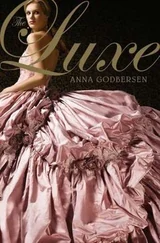Above the gentle din of decorous voices and clinking glasses, Penelope heard her name being pronounced with all its most recent and glorious trappings. “Mrs. Henry Schoonmaker!” went the beautiful sound, and Penelope turned. As she did, the fishtail of her skirt swept across the Versailles parquet. She immediately noted the approach of Adelaide Wetmore, who wore a dress of pewter faille. Her eyes were moist with self-regard, for her engagement to Reginald Newbold had only just been announced, and she was looking pleasantly weak with all the congratulations. She might have been pretty, Penelope reflected charitably, if not for her disproportionate mouth, and the way it garishly showcased her broad teeth.
“Why, Adelaide.” Penelope extended her white-gloved hand so that the diamond bracelet she wore fell down her wrist and caught the light. “Congratulations.”
“Thank you,” the other girl gushed. She took Penelope’s hand and made a dipping motion, almost as though she were going to curtsy. “We were all so inspired by your wedding,” she added with painful sycophancy. “What a celebration of love it was.”
Penelope communicated her gratitude with a few bats of her black eyelashes, and deduced from the way Adelaide was looking at the couple whose love she claimed to be inspired by that Henry’s gaze had wandered, and that he was exerting exactly no energy in trying to seem interested in the matrimonial doings of their peers. Penelope smiled her goodbye, and then she and her husband — who she was now realizing smelled of musk but even more strongly of cognac — pushed farther into the room. That was when Henry stumbled almost imperceptibly, catching himself on her arm, and Penelope felt her self-assurance flag a little over the sudden fear that someone might notice Henry’s drunkenness and begin to draw their own conclusions.
As she moved through the crowd, under the high polish of the vaulted ceiling, she tried to secure her grip on Henry. It wasn’t easy — but then, of course, it never had been. She gave knowing little nods of her head in the direction of some of the younger Mrs. Vanderbilts, assembled near the vast central palm in the middle of the room, and didn’t dare look in the direction of the man she was almost forcibly pulling along with her. She had believed him to be hers, time and again, but still she could not stay the feeling that he might at any moment slip through her fingers.
It had begun between them the previous summer, when her best friend, Elizabeth Holland, had been abroad, and she and Henry had started meeting amorously in the shadowy corners of their family homes. But then Elizabeth had returned in the fall and, with precious little reason, become Henry’s fiancée. Of course, that had been according to the wishes of their parents, and Penelope had rescued both of them from an unhappy marriage by helping Elizabeth fake her death. As she felt Henry list just slightly, she considered how poorly her efforts had been repaid, for not long after Elizabeth’s “death,” Henry had taken up with her little sister, Diana. That turn of events had not been entirely bad, since the fact of the younger Holland’s whoring about was the piece of information that Penelope had used to persuade Henry to marry her. All she had ever wanted was to be Mrs. Schoonmaker, and none of them wanted a messy scene.
Penelope possessed the mettle of a society lady ten years older, and there was forcefulness evident in her smallest movements. But even as Mrs. Schoonmaker, Penelope was unpleasantly surprised to discover that her ability to control Mr. Schoonmaker fell somewhat short. They glided amongst the guests, and when a waiter appeared carrying champagne flutes it was all she could do to keep Henry from lunging for one.
“Don’t you feel drunk enough already?” she admonished. Her smile never wavered, and she brought her upper lip back just enough to reveal the perfect whiteness of her teeth.
“I’ve had a lot,” he replied slowly, without particular venom, although the drink might possibly have been impairing his inflection. “But not enough to make me want to spend the evening with you, my dear.”
Penelope briefly shut the lids of her large eyes and stifled any feelings his comment might have aroused. Then she batted her mascara-darkened lashes and let her lake blue irises roll right and left. No one had heard, she determined with a small release of her shoulders, except perhaps the waiter, who wouldn’t have dreamed of looking her in the eye. When she spoke again, it was with effortless ease and a glass of champagne in her hand:
“When you put it that way, I suppose I should have one too.”
Thus fortified, the most envied couple in top-drawer Manhattan moved onward through the throng. The members of the Automobilist Club were making grand pronouncements about upcoming races, and the ladies who wanted to be near them were smiling patient smiles and assuming the poses of eager listeners.
“Ah, the Schoonmakers!”
Penelope twisted the length of her white neck so that the full blaze of her smile could be fully appreciated by her host. “Mr. Bouchard,” she purred, as he bent his long torso and placed his lips on her gray, full-length glove. The warmth in her voice was studied and convincing; it was a tone she reserved for men like Leland, who was heir to the Bouchard banking fortune and besides that universally liked. He was that rare high-born New Yorker who somehow or other had managed to make more friends than enemies, and was a particular friend of her brother, Grayson. As younger men they had lived in adjoining rooms at St. Paul’s. Penelope, ever watchful, noted Grayson’s presence by the window, where he was ensconced in conversation with her mother-in-law, the senior Mrs. Schoonmaker, whose dress of opalescent chiffon tiers did little to detract attention from her.
“I hope you’re both enjoying yourself,” Leland went on earnestly as he clasped Henry’s hand. His light blue eyes were open wide beneath his broad forehead, as though their enjoyment really was a crucial issue for him, and for all Penelope knew, it was. “Did you see the motorcar downstairs?”
“Could not have mishedut,” Henry answered enthusiastically, slurring the last two words.
Penelope elbowed him while maintaining her steady, bright gaze. “Such a beautiful object, Leland.”
“Thank you.” Leland’s eyes drifted and his chest rose, and for a moment he was someplace else. “Speaking of beauties,” he went on, his attention returning to Penelope, and this time with an added touch of sympathy, “how is your dear friend Elizabeth? It was terrible what happened, and not seeing her out has made us all worry.”
Until that moment Penelope had maintained a strong, smiling posture, and had stayed uncowed by Henry’s misbehavior or any askance glances from whichever young ladies in the room flattered themselves by imagining that they were the rival of the former Miss Hayes. But now her mouth constricted and she heard herself swallow hard. Leland went on looking at her with that same concerned expression. Henry’s weight on her arm bobbed a moment and then grew heavier. She only hoped that her face did not betray the insecurity this inquiry brought on, for of course Elizabeth was her dear friend by reputation only. Penelope had barely seen her since her unexpected return from what was supposed to have been a long exile in a western state — for truly, what was there to say?
“She is very well.” Penelope began to regain her composure, and even as she spoke reminded herself that she really would have to make a show of seeing Elizabeth, one that the papers took note of, and soon. “But it is still early for her to be going out. After her trauma. You understand, of course.”
“Of course.” Leland bowed his head, appearing almost embarrassed for having asked after a girl who had gone unaccounted for for over two months, and who might indeed have suffered any number of grave injustices. But before he could further anyone’s discomfort, he succumbed to the calls of his fellow driving enthusiasts, and excused himself. “Please do enjoy,” he said as he slipped into the crowd.
Читать дальше












